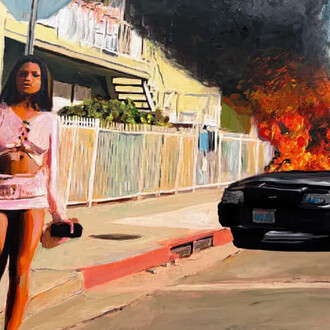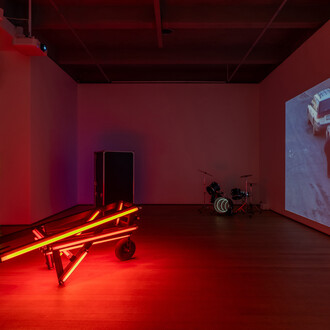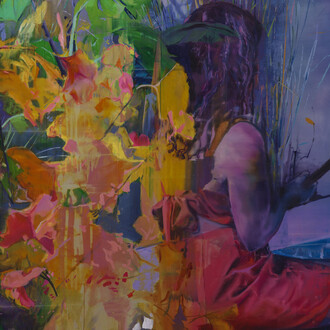Ángeles Agrela grew up in a traditional Catholic environment in a small town in the south of Spain. The country was just emerging from the Francoist dictatorship and National Catholicism, but while Agrela studied in a religious school, her parents were art collectors and fostered a cultural appreciation within her that extended beyond the church. They took her to museums, to the theater, to art galleries. Over her thirty-plus years as an exhibiting artist, her practice has grappled with the tension between her religious and artistic spirituality.
The subjects and patterns within Self-Portrait as a Schoolgirl, Agrela’s first solo exhibition with Nicodim and her New York debut, blend the artist’s Catholic upbringing with art historical and pop-cultural influences to embrace, subvert, and recontextualize the feminine motifs with which viewers are immediately familiar. When presented from the male gaze, the schoolgirl is a Lolita, a siren temptress luring weak men to hit me baby one more time. Depictions of girls from after the Fall of Man often cast them as undoers, coming in like wrecking balls to the social order.
Agrela toys with these expectations with brightly rendered schoolgirls like Vira, Loreto, and Delphine. They slyly mug for the viewer in poses that at first appear to be mimicked from the pages of Elle or Vogue and the advertisements within—from which they often are, the artist counts those as sources, as well as social media—but also mirror some of the mothers-as-martyrs from Baroque compositions. Agrela’s girls are coy, they are naughty, they are sexy, and they are subversively pious, beckoning for our devotion. They are Madonnas both modern and canonical, material girls living in an Apostolic world. Their hands, a new development in Agrela’s contemporary practice, are contorted into positions borrowed directly from Catholic iconography. When these organic shapes are contrasted with the mod-ish patterns on the clothing and backgrounds, the geometries that surface are sacred and chic.
On the topic of sacred and organic geometry, one would be remiss not to mention the omnipresent, capital-h Hair that weaves itself into and over the faces and bodies and surroundings of the artist’s subjects. These ‘dos do not dry any man’s feet. While the hair is at once arresting, it is an extension of each girl’s presence, persona, and gravity, more mitre than the main character. Agrela’s impossible hairstyles are consecrated by their immaculate depictions, each strand hallowed by her own precise hand. In this new body of work, each schoolgirl is a unique exorcism of repressive structures and ideologies, a celebration of style-as-liberation.
Ángeles Agrela (b. 1966, Úbeda, Spain) has resided in Naples, La Habana, and Berlin, and currently lives and works in Granada. Her recent works seek to conceptualize the role of women within the History of Art by creating a contemporary representative view.
Recent exhibitions include Self-portrait as a Schoolgirl, Nicodim, New York (2024, solo, forthcoming); The Paradoxes of the Aura, CICA, Vancouver (2023, solo); Immaculate Heart of Margaritaville curated by Devendra Banhart, Nicodim, Los Angeles (2023); Maternity Leave: None of the Women Born, Nicodim in collaboration with the Green Family Art Foundation, Dallas (2023); Kiaf Seul, Yusto Giner Gallery (2023); Art Busan, Yusto Giner Gallery (2023); Art Chicago, Yusto Giner Gallery (2023); Art Basel Miami, Nicodim Gallery (2022); Le Regard, Perrotin Gallery, Dubai (2022); Fauna, Anat Ebgi, Los Angeles (2022, solo); Facial Recognition, Fabien Fryns Fine Art, Dubai (2022); Disembodied, Nicodim, Bucharest (2022); Summer Nights, Stems Gallery, Paris (2022); Around the world, WOAW Gallery, Hong Kong (2022); Fanzination, Galería Yusto/Giner, Madrid (2021, solo); Art021 Shanghai, Galería/Yusto Giner (2021, solo). Ágrela is collected by CAC Málaga; Colección Banco de España; the National Library of Spain; the L´Oréal Collection; and many others.
















